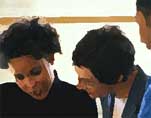Interview with Hector IbarraPresidential Award for Secondary Science Teaching, 1993 |
 |
Hector Ibarra became involved in writing for publication through his graduate studies at the University of Iowa, where he is currently a Ph.D. candidate. He has published numerous articles and a book on solar car racing throughout his 29-year teaching career. Hector teaches science for grades six and seven at West Branch Middle School (Iowa).
How did you get started in writing for publication?
I got into writing while I was working on my Master of Science degree as a result of research courses that required me to write. When I started my Ph.D. program, some of the courses required published writing and other courses required me to write grants. Courses in those two areas drove me to become a better writer. At first I did more grant writing and developed a knack for being able to write a proposal that was very concise. Then I began writing articles about some of the things I was doing in the classroom. I focused on things I really knew a great deal about, such as how to make solar cars, the impact of going to conventions and conferences, why it was important to belong to a professional organization, and how to infuse inquiry into your teaching.
I eventually worked my way up to writing a book about solar car racing. I had worked with the Iowa Energy Center on a five-year grant with over 100 middle schools in Iowa involved in solar car racing. As a result of that, I had lots of expertise and I wanted to make a book that would give students lots of possibilities but allow them to use their own inquiry to determine what materials to use to construct their solar cars. I knew somebody who owned part of a publishing company and they published it. Having a book published was an important step for me because now whenever I write an article or grant, I can show that I have written a book and that adds credibility.
How do you juggle your teaching responsibilities with writing?
I try to never have a lot of deadlines that are hitting at the same time. My advice would be to make sure that you work ahead of schedule so that things don’t pile up. Don’t be a procrastinator. Make sure you get started on what needs to be done. I also try not to get too stressed or worry too much. I try not to get overwhelmed when I have several things that need to be done. If I do, I remind myself that if I start on one task, then I’ll free myself up to work on other tasks that need to be done. Personal goals sometimes take a back seat. I think that teachers that are used to multitasking won’t have a problem.
What advice would you give to a teacher who wants to start writing for publication?
The best thing to do is to practice writing. The more you write, the better you're going to get at it. I would also encourage teachers to take a master’s course that requires you to write and the professor grades what you're writing. The other part that is really crucial is that they learn to outline what they write. Put down some ideas and then follow through with the writing. It helps you to figure out exactly what you’re going to write about. Also, believe in your ideas and your writing. If you don’t believe in something, how do you expect other people to believe in it?
Starting is really the hardest part. You just have to keep at it until you get beyond that difficult part. I’ll sit down and write the whole thing within a couple of days. Then I put it away and give myself a week or so to regroup. Then you go back and start seeing it in a different light. Then you can really start making revisions.
What role has having a mentor or someone to read your work played in your writing?
Having someone read my writing has been extremely helpful. My wife actually mentors me more than anyone. She’s constantly encouraging me to write an outline first. We work really well as a team because different people see things in different ways. I’ve always been able to be creative with ideas, but at times I need advice on how to convey those ideas in a message that people can understand.
If you’re going to share your writing with colleagues or your department chair, you have to feel comfortable with them. When you have somebody read your writing, you are taking a bit of a risk. How are you going to feel if what they say isn’t what you want to hear? You also want to feel that you can trust the person with your ideas—that they will keep the ideas to themselves and help guide you in the right direction. Now that I have lots of experience writing, I read colleagues’ grants or articles and give them advice on their writing. It gives me great pleasure to help them out.
What do the various publications want (or not want)?
When you’re writing grants or an article, there are often guidelines for you to follow and specific categories you have to address. You can focus on conveying the message that is needed in each one of those categories. If you're writing for a publication for teachers, you should write about something that works in a classroom. Being teacher friendly or user friendly is one of the big things publishers look at. But it really depends on what you want to share with the reader. There are so many different publications out there, and they all are meeting the needs of whomever is buying that particular journal. The publisher will also edit your writing and I try not to take that too personally.
What advice would you give in terms of establishing credibility with publications?
When I write articles for Science Scope or Science Teacher, I know my material doesn’t have to go under a very critical review. They just go right into the next step before publication. I don't have to wait around for six months. For teachers who are starting out, everybody has to pay their dues to get from point A to point B. You have to let people know that you can produce something and it doesn’t take long to revise it. The first article I wrote for Science Scope was turned down. And then within a couple of months, I received another letter that they had accepted it.
How do you think your experiences with writing for publication contribute to the advancement of science reform?
I believe that the articles I have written are of interest to teachers who are doing similar investigations. These articles are written with the intent to guide teachers who are interested in implementing inquiry-driven investigations into their curriculum. Other articles address the importance of partnerships or why it is important to attend national conferences. The intent is to help teachers realize the numerous benefits that occur because of the networking that is established by meeting new people.
If you have any questions you would like to ask Hector Ibarra about his experiences writing for publication, contact him at hector-ibarra@uiowa.edu

